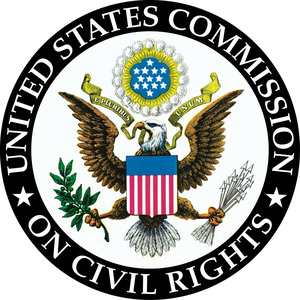WASHINGTON, Sept. 18, 2024 /PRNewswire/ -- Today, the U.S. Commission on Civil Rights released the report, Federal Efforts in Examining Racial and Ethnic Disparities among Victims of Violent Crime. This report was undertaken in response to the Commission's commitment to addressing the deep- seated inequities that persist within our criminal legal system, particularly as they impact underserved communities. The COVID-19 pandemic has exacerbated these longstanding challenges, underscoring the urgent need for this investigation. The report analyzes federal efforts to assess racial disparities in crime victimization, focusing on how violent crime disproportionately impacts minority communities.
Crime victimization has wide-reaching consequences for victims, their families and friends, their communities, and society in general. The rate of violent crime victimization has decreased dramatically since its peak in the early 1990s. However, the nation recently experienced an increase in serious forms of violence. In 2020, homicide rates were 30 percent higher than the previous year. In the same period, aggravated assaults, including nonfatal shootings, also increased.
While there is no difference in the risk of victimization overall based on race, there are disparities amongst other demographics and in certain types of crimes. Black Americans are 12 times as likely as White Americans to die by firearm homicide. Crime concentration in certain areas became associated with race because contemporary disadvantaged neighborhoods are predominately Black or Latino. People living in households that earn the lowest incomes are more likely to be victimized than their higher-income counterparts, and young people are more likely to be victims of crime as well.
A major impediment to exploring crime victimization rates is that many crimes, even violent crimes, are not known to law enforcement. In 2020, only 40 percent of violent victimizations were reported to police. Compensation and assistance programs are available to crime victims, but longstanding research shows that these programs are underutilized, mostly because victims are not aware of the programs and services available to them.
"Behind each statistic is a human life—a family, a community impacted by violence. Our report found that even when victims are aware of services, hurdles like police reporting requirements make them difficult to access, thereby perpetuating cycles of violence and victimization. In communities long neglected and marginalized, there is often a deep-seated distrust of law enforcement," said Rochelle Garza, Chair of the U.S. Commission on Civil Rights. "We need a holistic approach to crime prevention and victim services that builds trust in law enforcement and provides culturally sensitive care."
To read the full report, visit https://www.usccr.gov/reports/2024/federal-efforts-examining- racial-and-ethnic-disparities-among-victims-violent-crime-0
The U.S. Commission on Civil Rights is the only independent, bipartisan agency charged with advising the President and Congress on civil rights and reporting annually on federal civil rights enforcement. Our 56 state and territory Advisory Committees offer a broad perspective on civil rights concerns at state and local levels. The Commission: In our 7th decade, a continuing legacy of influence in civil rights. For more information about the Commission, please visit www.usccr.gov and follow us on Twitter and Facebook.
Contact: Joe Kim
[email protected]
202-499-0263
SOURCE U.S. Commission on Civil Rights

WANT YOUR COMPANY'S NEWS FEATURED ON PRNEWSWIRE.COM?
Newsrooms &
Influencers
Digital Media
Outlets
Journalists
Opted In





Share this article